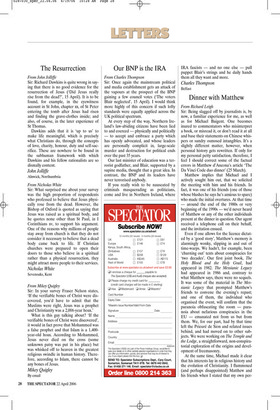Dinner with Matthew
From Richard Leigh
Sir: Being slagged off by journalists is, by now, a familiar experience for me, as well as for Michael Baigent. One becomes inured to commentators who misinterpret a book, or misread it, or don’t read it at all and base their statements on Chinese whispers or sundry osmosed intangibles. It’s a slightly different matter, however, when personal history gets rewritten. If only for my personal petty satisfaction, therefore, I feel I should correct some of the factual errors in Matthew d’Ancona’s article ‘The Da Vinci Code duo dinner’ (25 March).
Matthew implies that Michael and I actively sought him out, that we solicited the meeting with him and his friends. In fact, it was one of his friends (one of those whose blushes he says he’s anxious to spare) who made the initial overtures. At that time — around the end of the 1980s or very beginning of the 1990s — we’d never heard of Matthew or any of the other individuals present at the dinner in question. Our agent received a telephone call on their behalf, and the invitation ensued.
Even if one allows for the licence dictated by a ‘good story’, Matthew’s memory is alarmingly wonky, slipping in and out of time-warps. We hadn’t, for example, been ‘churning out’ texts about conspiracies for ‘two decades’. Our first joint book, The Holy Blood and the Holy Grail, had appeared in 1982. The Messianic Legacy had appeared in 1986 and, contrary to what Matthew says, there were no sequels. It was some of the material in The Messianic Legacy that prompted Matthew’s friends to convene the evening’s repast; and one of them, the individual who organised the event, will confirm that the paranoia obfuscating the room — paranoia about nefarious conspiracies in the EU — emanated not from us but from them. We, for our part, had by that time left the Prieuré de Sion and related issues behind, and had moved on to other subjects. We were working on The Temple and the Lodge, a straightforward, non-conspiratorial exploration of the origins and development of freemasonry.
At the same time, Michael made it clear that his interests lay in religious history and the evolution of Christianity. I flummoxed (and perhaps disappointed) Matthew and his friends when I stated that my own per sonal priorities were literary — that the latest novel by Gabriel García Márquez, Carlos Fuentes or Michel Tournier was of more consequence to me than the machinations of the EU, or whether Jesus and the Magdalene had progeny.
I welcome this opportunity to caulk the holes in Matthew’s memory. But there’s one other, admittedly trivial, point for which I’m not sure I can call his memory alone to account. Matthew begins his article by stating that Michael and I ‘have become familiar faces on our screens’. If we’re indeed so familiar, why then, I wonder, does he choose to stick a beard on me — a beard I’ve not worn since my first year of graduate school decades ago?
Richard Leigh London NW1



































































 Previous page
Previous page